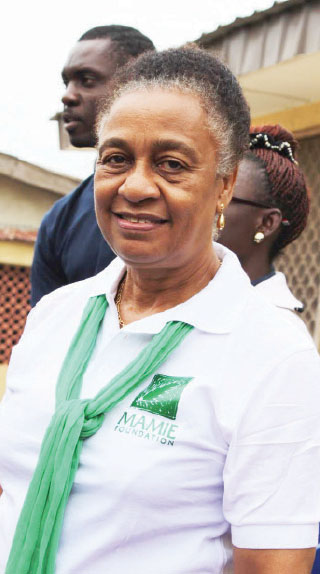A lot of things happen in Nigeria, with people who care about others working tirelessly to improve society’s lot and taking no credit for it. One such person is Dr. Modupe Ladipo, a consultant family physician with the University College Hospital (UCH), Ibadan, and part of the Mamie Foundation. In this interview with Assistant Life Editor, TERH AGBEDEH, in Oke-Ayedun, Ekiti State, where the foundation took part in a medical outreach early this month, she talks about her work.
First, you must be commended for what you have done. You and your husband are phenomenal, as if you do this every day.
Sort of (laughs).
Are the ailments you found here in the course of the outreach different from what you have treated elsewhere in the country?
The ailments themselves, if you list them, are not different; but it is the number of people who have a particular ailment that may cause some concern. Especially, we found that a lot of people were hypertensive. And not just hypertensive, but severely hypertensive. Some didn’t even know that they were hypertensive. We had to give some treatment and observe them for about two or three hours before we could even allow them to go home. That means that their blood pressures were very high. We had to do a lot of counselling; how they should modify their lifestyle, their diet, exercise, taking their medication and going for regular check-up. That was the most striking one: hypertension. But all the others are common ailments in the rest of the country: malaria, diabetes, arthritis, cough, catarrh and such ailments.
Do you think that if the clinics here were up to standard, these ailments would be the way they are?
Well, they may be better controlled. But we may still find the same type of prevalence of the diseases. Some of this non-communicable diseases like hypertension and diabetes are from our lifestyle, and people don’t really pay attention or go to the hospital until they have some symptoms. But as these diseases are developing, they don’t really have any symptoms. So, the patients stay away and continue with their wrong lifestyle. We have been to the few general hospitals and health centres that they have. The last time we came here, we did our outreach in the health centre, it was well equipped and the personnel were adequate. But, of course, they will only treat people who come; they don’t go out to the community. So it depends also on the awareness of the community.
This couldn’t have come at a better time since civil servants have not been paid since January, and the health centres here have been closed for over three weeks. The dentists didn’t get that much patronage during the outreach, a lot of people don’t visit dentists. What do you think can be done to change that?
Well, again, it is awareness. Many people take it that dental problems are not something that they should take to the hospital. They have some traditional treatment for toothache and things like that. So they are not really aware.
It’s not just here; even in the cities.
And they are afraid, I think, of the dentist because when they see all those tools the dentist uses to drill, chisel and mallet, they are afraid because it is like going for surgery. So the awareness needs to be there, so that people can start from their youth to go to the dentist for a regular check-up. It is not just when they have toothache, so that their dental architecture will remain good for as long as possible.
You did no surgery yesterday. Was there no serious situation to warrant that?
We didn’t plan to do any surgery because we were spending a short time and we would have to follow up those surgical procedures. Also, because the health centres were not functioning, even when we leave, we have to hand over the cases to some medical personnel to follow up. Since that was not in place, we decided not to perform any surgery.
You work with volunteers, mostly, on this outreach. The volunteering culture is absent in this country; young people don’t volunteer that much as they do in other climes. What do you think can be done to change this?
Actually, I think it is changing. Maybe from the outlook of the new churches because I know that a lot of churches do go on outreaches; the young people go to schools, they go to help the elderly and so on. So, I think that would change with time because they are finding that they need some purpose to their lives. Since the government is not able to do so much, there is a lot of gap that they can fill.
MAMIE Foundation paid for the drugs on this outing; do you want to tell us how much it cost and if you did it with the help of funding from another organisation(s)?
I can’t tell you how much exactly until we get back and compute everything because the (Ala) family and MAMIE Foundation bought different things. But this is out of our pockets. There is no funding as such. We get little donations for the foundation and is not probably enough for all the expenses.
Would you like to get funding?
Of course, we would like to get donations to further the cause of the foundation.
You do quite a lot; readings, scholarships. How is all that work going?
Well, it is going well. We have had a few students. In fact, one has qualified as a medical doctor. There are still some in secondary school. For the book club, there was a bit of hiccup to get people together and then the economic situation, the recent petrol crisis and stuff like that. Once there is opportunity, we gather interested people together for book readings. Usually, we choose books written by African authors. The beekeeping is going on and we just harvested some honey in the rural forest where we have a forest conservation just outside Ibadan. That is going on.
Where would people find the honey you mentioned?
We are trying to set up a cooperative for the villages around that area. So, once they harvest the honey, we will then be able to market it to the people. That is the process where we are at just now; trying to harvest the honey, bottle it, register and get it into the market. The income will be given to these rural women who are tending the beehives, so that they will have some extra income for their families.
You work at UCH and are involved with this foundation; how do you manage both. How does it work out?
I think it is the grace of God and finding the time. It is not as if the time is there, but we find the time. The date for this outreach, for instance, we have been thinking about it since last year and we just found this little gap where a lot of us could come together. So, we go on with our normal careers and we try and fit in these things. It takes planning.







